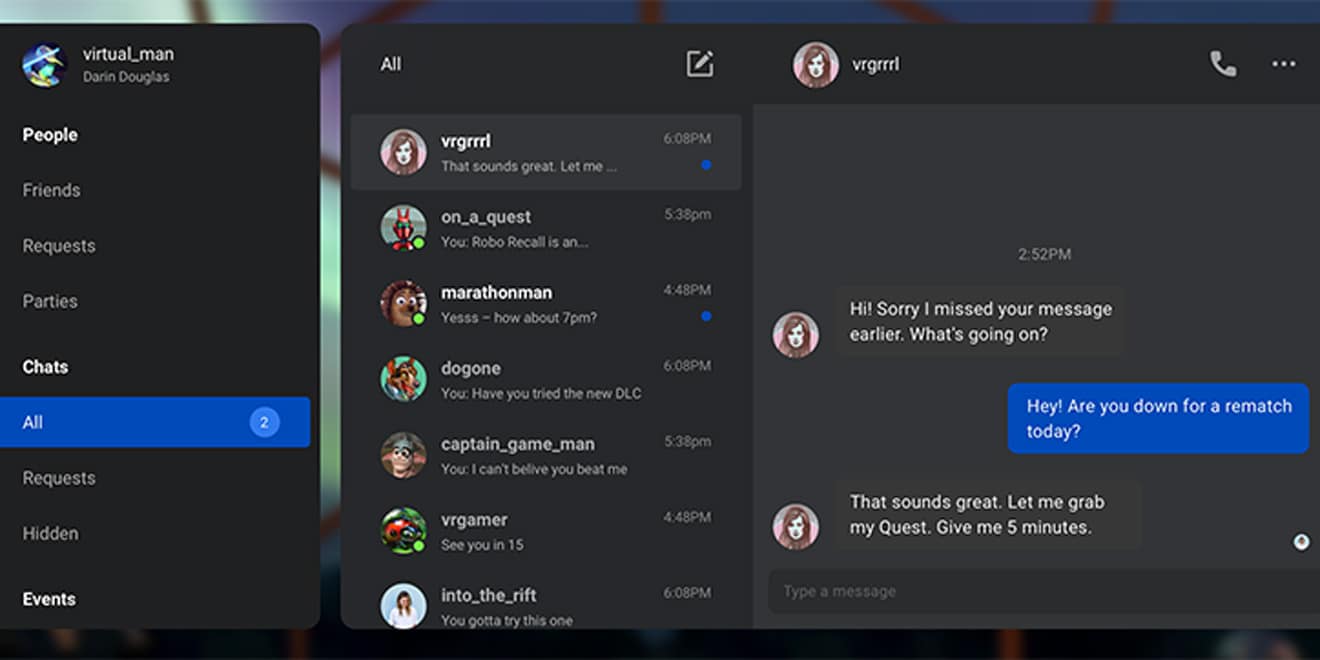Ads are coming to virtual reality.
When people using headsets from Facebook’s Oculus log into the social network through their devices, Facebook will begin using information about their gaming activity to shape their experience on the Oculus social platform, including which third-party ads they see.
Oculus introduced several updates to its social experience in a blog post, as well as its privacy policy.
At its Oculus Connect 6 conference in September, the company said it would begin rolling out a new social layer across its platform, powered by Facebook, for which it would require people to log into Facebook in order to access features such as chats, events, access Facebook groups, parties, co-watching in Oculus TV and adding friends.
Oculus said in a blog post at the time, “In order to provide these features, we’ll use information like your friend list, how often you jump into VR and which applications you use to provide better VR-related recommendations on Facebook, including relevant Facebook groups you may want to join, Oculus events you might like to attend or ads.”
The company elaborated this week, saying that Facebook will use information from logged-in Oculus users to provide more relevant content and ads on the Oculus social platform. Examples include recommendations for Oculus events people may be interested in or VR apps available via the Oculus Store.
Oculus users who do not log in to Facebook will not have their data shared.
An Oculus spokesperson stressed that device data such as 3D maps of people’s environments is only stored locally, on users’ headsets, and not stored by Oculus or Facebook or used to target ads.
The social features now available to Oculus users logged into Facebook are: chats, enabling the messaging of friends in or out of the headset; the ability to join friends via links to exactly where they are within apps; user-organized meetups or multiplayer games; sharing photos, videos and livestreams directly to Facebook from VR; creating parties that any Oculus friends can join (they had previously been invite-only); and the ability to share links via Messenger to the user’s exact location in apps or games.

Oculus also reminded its users that they maintain separate Oculus usernames, profiles and friends lists, whether or not they are logged into Facebook, and they maintain complete control over what is posted to their Timelines when they are logged in.
Facebook’s oversight of Oculus—which it acquired in July 2014 for roughly $2 billion—followed the pattern the company established with its other high-profile acquisitions, Instagram and WhatsApp.
The company starts out with a hands-off approach, allowing its acquisitions and their apps to remain independent, until the call of monetization becomes too loud, usually resulting in the departure of founders.
WhatsApp co-founder Brian Acton left the company in September 2017, famously tweeting, “It is time. #DeleteFacebook,” in March 2018.
Fellow WhatsApp co-founder Jan Koum followed suit in April 2018, also relinquishing his seat on Facebook’s board of directors.
And in September 2018, Instagram co-founders Kevin Systrom and Mike Krieger shockingly and abruptly left the company, with Systrom saying the following month, “No one ever leaves a job because everything’s awesome, right?”
However, this wasn’t necessarily the case with Oculus, as co-founder Palmer Luckey left in March 2017 amid a controversy over his contributions to pro-Donald Trump nonprofit Nimble America.
Oculus chief technology officer John Carmack revealed last month that he was scaling back into a consulting role but offered no indication that the move was prompted by conflict with Facebook.
https://www.adweek.com/brand-marketing/facebook-ad-targeting-logged-in-oculus/

